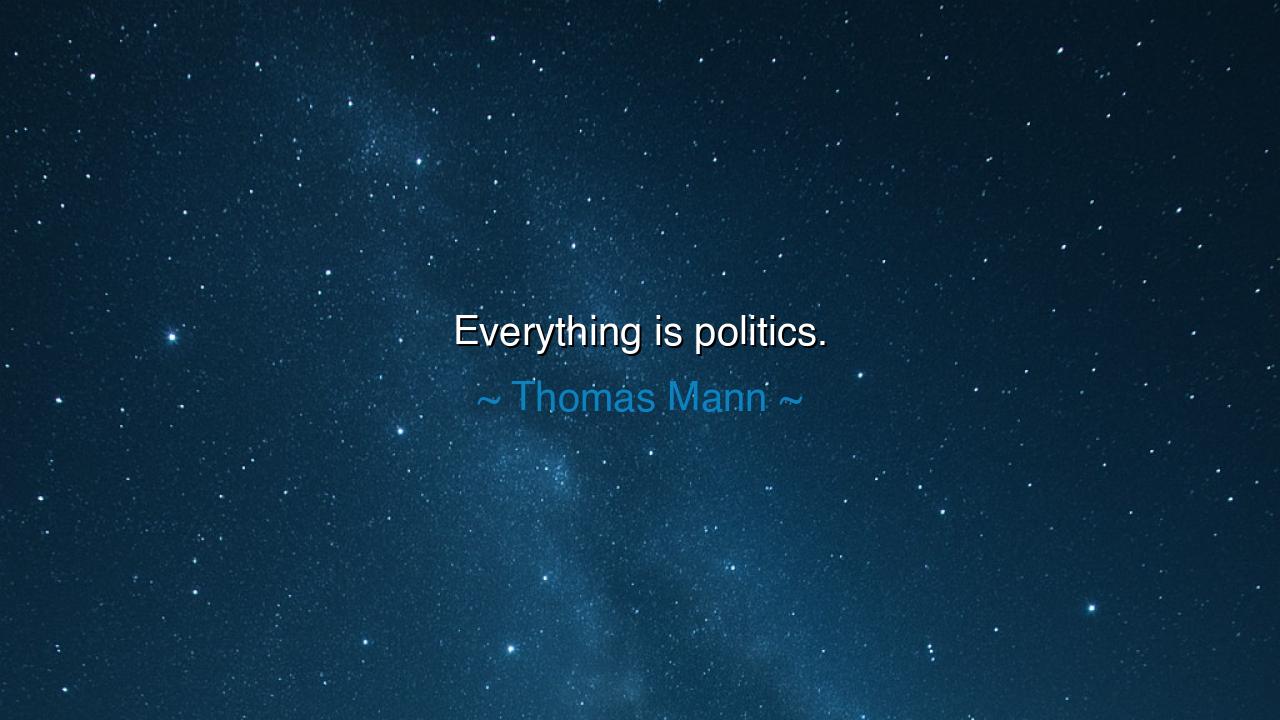
Everything is politics.






The words of Thomas Mann, novelist and seer of the twentieth century, fall like a hammer upon illusions: “Everything is politics.” In this saying, he unmasks the truth that politics is not confined to parliaments and palaces, but seeps into every corner of human life. From the bread upon the table to the school where a child learns, from the freedom of thought to the silence of censorship—politics shapes, directs, and determines. To say “everything” is to declare that no act, no space, no soul is untouched by power.
The ancients, too, knew this truth. Aristotle called man a politikon z?on—a political animal—because he cannot live outside the community, and the community is governed by laws, choices, and power. Even the simplest matters—who tills the land, who may speak in the assembly, who is counted free or enslaved—are political decisions. Mann, who lived through the rise of fascism in Germany, saw that to ignore this truth is perilous, for even silence becomes a political stance when tyranny reigns.
Consider the story of Nazi Germany, when many artists, thinkers, and citizens claimed neutrality, insisting their work or lives were “above politics.” Yet the regime conscripted even silence, turning apathy into complicity. Books were burned, art was censored, voices crushed. Mann himself was forced into exile, his words carrying the weight of resistance. His declaration that everything is politics was born from fire: a warning that no one may stand outside the struggle between justice and oppression.
His saying is also a call to vigilance. If everything is politics, then every choice matters—the words spoken at a table, the stories told in a classroom, the art painted upon canvas. To dismiss these as “non-political” is to forget that power is always watching, shaping, and taking hold. The wise soul learns to see the political thread in every matter, so that they may act with awareness, not be swept blindly by forces they deny.
Let the generations remember: to live is to be entangled in politics, whether one chooses it or not. To eat is political, to read is political, to speak or to remain silent is political. Thomas Mann’s wisdom is thus both burden and summons: we cannot escape the realm of power, but we can choose to wield our part in it with courage. For when we see that everything is politics, we also see that everything is opportunity—to resist, to shape, to build a more just world.






ASAzusagawa Sakuta
Mann's statement is a stark reminder that we cannot fully escape the political world, even in our most personal decisions. Politics, whether we acknowledge it or not, plays a role in shaping societal norms and expectations. But I do wonder, can we ever truly separate our personal beliefs from political ideologies? Is there such a thing as non-political space, or does politics always seep into every corner of our existence?
TDThuy Diem
I find Thomas Mann's quote both insightful and somewhat limiting. While politics undeniably affects many aspects of our lives, does it mean that every action we take is driven by political forces? What about personal experiences or actions that aren’t influenced by government or power struggles? It’s an interesting perspective, but I wonder if it oversimplifies the complexities of human life and the diversity of motivations that shape our choices.
VDvan duoc
Mann’s statement feels somewhat overwhelming, as it suggests that politics infiltrates everything in life. On one hand, it’s hard to deny that politics shapes many systems and interactions. However, I can’t help but wonder if focusing so much on politics can detract from other important aspects of life, such as personal growth, art, and relationships. Are we at risk of seeing every issue through a political lens, even when it doesn’t need to be?
YYuuku_VN
This quote resonates with me because it highlights how intertwined politics is with almost every decision we make, whether we realize it or not. But at the same time, I wonder—does everything really boil down to politics? Are we reducing all human interactions and decisions to mere power dynamics and governance? Isn’t there room for personal autonomy, creativity, and freedom that isn't influenced by politics? I’m curious how others interpret this idea.
TNthuy nguyen
Thomas Mann's quote makes a compelling statement about the pervasiveness of politics in every aspect of life. It’s true that decisions made in the political arena often have far-reaching consequences in areas like business, education, and even personal relationships. But does this mean that everything we do is inherently political, or is Mann trying to point out that we can’t escape the influence of politics? Can we still maintain personal spaces that are free from political influence?